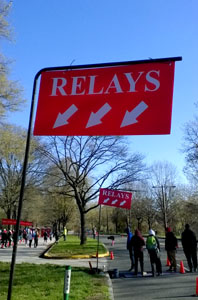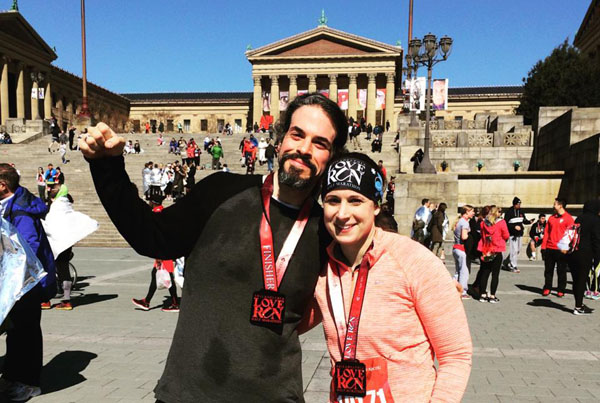Strapping it to my Bad Leg
“The whole idea is not to beat the other runners. Eventually you learn that the competition is against the little voice inside you that wants you to quit.”
– Dr. George Sheehan, Senior Athlete
“You’re the only one who’s really been training for this thing, Keith, so you’re crossing the finish line—and I want no buts about it!” My little sister (grown up) typed to me over email, as to who should complete which leg of the Philly LOVE Run Half-Marathon Relay. There’s really no one in the world who can talk to me as clearly as Tiffany.
This would not be my first time racing in Fairmount Park. My second 5K race ever, Cupid’s Chase was held there in 2013. I wrote about in Harder the Second Time, an article addressing how the grind of maintaining a new health habit can undermine individual success. Three years later my sister gives me the honor of crossing the finish line of a three-person relay covering 13.3 miles.
I think as I run, and I take pictures. My thoughts turned to how lucky I was to have Tiffany passing the GPS ankle bracelet (the modern baton) to me and to Kristen, a person whom I never met, or met that day, who started the race for us. “Too often, when we think about resilience, we miss the important social parts to people’s success,” Dr. Michael Ungar wrote on the value of support systems. I’ve written before about my life-defining effort to live beyond my disability. As I have mentioned, and like Dr. Ungar observed, the success of my life and the success of the finished LOVE Run are not my own. “Like all of us,” he wrote, “success is a team effort” (Ungar, 2014).
“Social support means having friends and other people, including family, to turn to in times of need or crisis to give you a broader focus and positive self-image,” according to Dr. Susan Towny, Professor, Psychologist, and Registered Nurse (Towny, 2016). “Social support enhances quality of life and provides a buffer against adverse life events,” and it helps a guy struggling to maintain a new health habit keep running three years later.
All of our lives have not been easy. I crossed that finish line grateful to my sister, her friend, my parents, friends who’ve picked me up when I’ve been down and coaches who help me keep my eating and exercise in balance. All of us have gotten tired or fallen flat. Everyone has someone to pass the GPS tracker to when they get weary. But sometimes finding them, and handing off our burden, is the hardest part.
Vulnerable, Meet Dependable
“You only ever grow as a human being if you’re outside your comfort zone.”
– Percy Cerutty, World Renowned Athletic Coach
“Support System” is such an official term that it makes the idea too big and overlooks the obvious. “Of course, many children with disabilities can find resources through charities or government programs,” Dr. Ungar said, seeming to fall into that trap while referencing the agreeably extreme case of a disabled rap star, “but few will have such an incredibly supportive network around them that look beyond their disabilities.”
 I have only to go through the roster of people I’ve worked with over the years to politely refute such a statement. Everyone I work with has some support system, even if it’s just me and the team of which I’m honored to be part. But most often it’s not us. It’s a mom, a Grandpa, a neighborhood, a church group, a fellow in the struggle at work. My sister has been with me since I was four years old, though I can’t exactly tell you when she became part of my support system and it’s the same with my family, friends and coworkers.
I have only to go through the roster of people I’ve worked with over the years to politely refute such a statement. Everyone I work with has some support system, even if it’s just me and the team of which I’m honored to be part. But most often it’s not us. It’s a mom, a Grandpa, a neighborhood, a church group, a fellow in the struggle at work. My sister has been with me since I was four years old, though I can’t exactly tell you when she became part of my support system and it’s the same with my family, friends and coworkers.
Though the “when” a person becomes part of our support system may be elusive, the “how” is not. A person becomes part of our support system in two flip-sides of the same coin: Vulnerability and Dependability.
When hard times, emotional or mental stress or illness hit we are forced past the social pleasantries and we simply get real with someone. We let ourselves be vulnerable. This is a huge thing for all of us, and is usually with somebody who has proven themselves trustworthy with some of the smaller pains of our heart and thus are dependable. Then, if they help us, the bond of friendship naturally deepens. It’s not official, it’s simple life. It usually goes unnoticed at the moment and may not be fully realized until years later—especially by the person whom helped so vitally when they just think of as being a good friend.
Perhaps there is a biological drive to the seeking out others in times of stress since having a support network has “been shown to reduce the psychological and physiological consequences of stress, and may enhance immune function.” The key to fulfilling this drive is to not overlook those natural relationships who are around us and may be primed for a moment of vulnerability, but also to keep seeking if there are none present. “Social networks…provide a sense of belonging, security, and community” even if they’re part of your church book store, quilting circle, pool club or found online (Towny, 2016).
I Have No Bad Leg
“Human beings are made up of flesh and blood, and a miracle fiber called courage.”
– George Patton, U.S. General
Tiffany could tell you that growing up I used to refer to my left leg as “my bad leg” because it was the leg which my mild case of Cerebral Palsy affects most. I used my bad leg as an excuse to avoid trying many things in life, the greatest of which was running. I had told myself for over 30 years that I can’t run, can’t play sports, but it was those around me even as a child who made sure that I didn’t let myself fall too far into my “can’ts” so that when I was ready, I learned what they had always believed; I was stronger than I thought. If it weren’t for all of them—family, friends, coworkers, church, coaches—I may never have met my wife, my strongest supporter, or my daughter who cheers me on even at seven years old.
wife, my strongest supporter, or my daughter who cheers me on even at seven years old.
“In fact, social support is now proven to be a literal life-saver,” Dr. Towny (2016) said, and I’m proof of that. “People that are supported by close relationships…are less vulnerable to ill health and premature death. Individuals afflicted with leukemia or heart disease have higher survival rates. Those who have close personal relationships cope better with various stressors, including bereavement, job loss, [trauma], and illness.”
The truth is, I have no bad leg; I have a strong will and strong supporters that I may never had noticed if I didn’t get real, get vulnerable and get moving. I am more than my disability and the only real problem I had was that in my weaker moments I didn’t realize it as fully as those around me. I overlooked them or I let my negative self-image stop me from reaching out. I strapped the LOVE Run GPS to my “bad leg” intentionally, to remind me of the love, support and deep gratitude which still helps me overcome my weaknesses.
If you’re like me, your social support network has been there the whole time. Go hug one. If you really feel like you have no one, reach out. Please, contact me, and I’ll help! “We need to stop thinking about ‘dis-abilities’ and start thinking about all people as differently abled” to find “a profoundly positive way” to build our social networks (Ungar, 2014).
Perhaps I’m one of the ‘”differently abled.” Perhaps I’m a member of an official support system as a Licensed Professional Counselor. Perhaps I’m part of a spiritual one as a Chaplain. Perhaps I’m just the friend or the brother. In the end, I’m naturally all of them and so are we all.
I crossed the finish line thanks to my social support system, and even someone from my sister’s. There wasn’t anything official or acknowledged about it; it was just people doing what people do—setting a goal and hitting it together through pain and weariness to triumph.
__________________________________________________
Towny, S. (2016) Taking Charge of Your Wellbeing: Social Support. University of Minnesota Center for Spirituality & Healing. Retrieved from: http://www.takingcharge.csh.umn.edu/explore-healing-practices/social-support
Ungar, M. (2014) Nurturing Resilience: Some of Us Wear Our Disabilities on the Outside. Psychology Today. Retrieved from: https://www.psychologytoday.com/blog/nurturing-resilience/201410/some-us-wear-our-disabilities-the-outside


